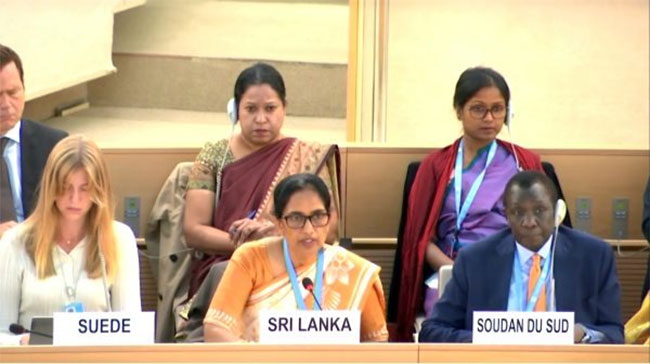The Government of Sri Lanka has rejected the latest report on the island nation by the UN High Commissioner for Human Rights, accusing it of exceeding the OHCHR’s mandated sphere of human rights to comment on macroeconomics as well as financial and budgetary issues under sovereign parliamentary purview.
Speaking as the country concerned following the presentation of the report of the Office of the High Commissioner for Human Rights (OHCHR), Sri Lanka´s Permanent Representative Ambassador Himalee Arunatilaka elaborated that Sri Lanka has succeeded in stabilizing its economy through a combination of prudent economic decision-making and financial oversight and governance as acknowledged widely.
Sri Lanka also reiterated its long-standing commitment to engaging with the UN, the Universal Declaration on Human Rights and the related Treaties.
The Permanent Representative further stated that while strengthening the economy for the prosperity of all Sri Lankans is a priority for the Government, Sri Lanka continues to make progress on national unity and reconciliation.
Continued efforts through domestic processes, including the Office on Missing Persons (OMP), Office for Reparations (OR), Office for National Unity and Reconciliation (ONUR), the Office for Overseas Sri Lankans and the Interim Secretariat for the Truth and Reconciliation Mechanism (ISTRM) were highlighted, while details were provided in the Government’s written response to the OHCHR Report.
Ambassador Arunatilaka highlighted that social protection measures such as the ‘Aswesuma’ programme have been put in place to support vulnerable groups. It was underlined that the Report exceeded OHCHR’s mandate by commenting on macroeconomics as well as financial and budgetary issues under sovereign Parliamentary purview.
The Permanent Representative expressed Sri Lanka’s disassociation from the report of the OHCHR which lacked balance and failed to acknowledge the atrocities committed by the LTTE during decades of a brutal terrorist conflict.
Sri Lanka reiterated its strong rejection of Resolution 51/1 and the external mechanism established within the OHCHR which is unwarranted and counter-productive.
The Ambassador further said:
“Let me restate at the outset, Sri Lanka’s opposition to Human Rights Council Resolution 51/1 which mandated the report under consideration and the establishment of the external evidence-gathering mechanism.”
“This resolution was adopted without Sri Lanka’s consent by a divided vote within this Council. We disassociate with the report for the reasons stated in our detailed response, available on the OHCHR website.”
“It is most surprising that the report steps far out of its mandated sphere of human rights to comment on macro economics as well as financial and budgetary issues under sovereign parliamentary purview. Contrary to the reaction of the rest of our international partners, it projects a negative overview for Sri Lanka’s future, fails to recognize social stabilization and the preservation of parliamentary democracy overcoming recent severe challenges, the return to normalcy with the restoration of food, energy and public services and stability arising from significantly improved outlook.”
“Furthermore, it makes no mention of the brutal acts of terrorism and human rights violations committed by the LTTE, including child recruitment, suicide bombings, assassination of democratically elected MPs and leaders in SL and abroad, and the disruption of democratic rights and freedoms of the people, especially in the North and the East.”
“I wish to once again emphasize Sri Lanka’s strong rejection of Resolution 51/1 and the external evidence-gathering mechanism established within OHCHR. This unproductive and unwarranted mechanism exceeds the Council’s mandate, contradicts its founding principles, and polarizes the Council, undermining the progress we have made domestically.
“The selective and disproportionate focus on handpicked developing countries while ignoring critical situations elsewhere is unacceptable. We urge the Council to avoid politicization and double standards, and to focus on dire humanitarian situations that require urgent action to maintain its credibility.”













